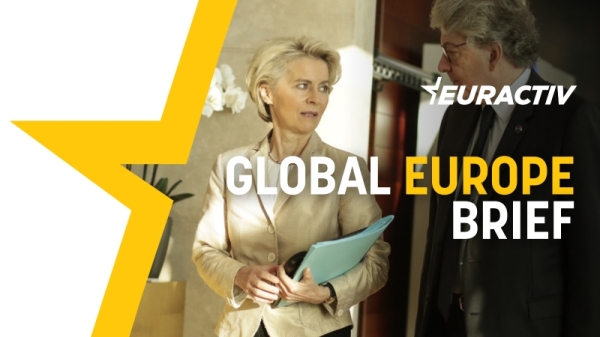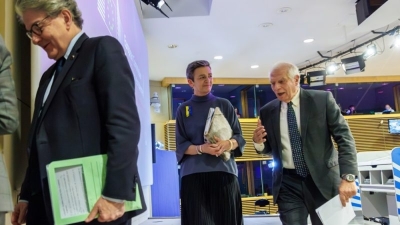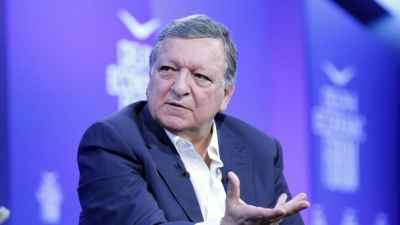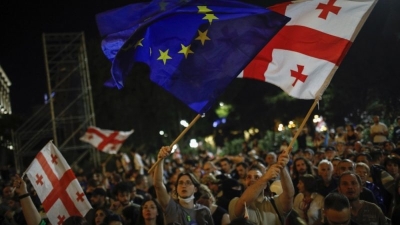Expect European defence to become election battleground

Welcome to EURACTIV’s Global Europe Brief, your weekly update on the EU from a global perspective. You can subscribe to receive our newsletter here.
Gloves undoubtedly came off this week between European political parties before the June EU elections, with everyone wanting to be the knight (or dame) in shining armour.
With Russia being increasingly seen for what it is, even in Western Europe, and amid fears that former US president Donald Trump could withdraw American security guarantees that have sheltered Europe since the end of the Second World War, Brussels has changed.
European defence has come a long way, out of obscurity straight into the spotlight as one of the decisive topics of this year’s European elections campaign.
European Commission President Ursula von der Leyen, officially confirmed as the lead candidate of her centre-right European People’s Party (EPP), is basing her second-term strategy on more military might and less climate talk.
For the former German defence minister, if elected, this means a push for a new EU defence commissioner and more pressure for the bloc’s member states to join forces on their defence spending.
The European Commission this week also unveiled its long-awaited European Defence Industrial Strategy, spearheaded by Industry Commissioner Thierry Breton (Renew Europe), which some hailed as more taboo-breaking on the road to making the EU a defence powerhouse.
Rest assured, the plans are likely to run into problems – lack of money and fear in EU member states that the Commission will use the strategy as a tool to grab more from national competencies. And a fierce battle in inter-institutional negotiations by EU member states and the new European Parliament.
While Breton steered clear of too politically charged pitches, European Commission insiders have no doubt he already has eyes on the new portfolio. Though he might temporarily not be in the good books with von der Leyen for another reason.
The EU executive created a dedicated defence and space directorate — DG DEFIS — in 2019, led by the French commissioner, a close ally of President Emmanuel Macron. Breton has been instrumental in the increasingly pressing issue related to the production of ammunition and Europe’s striving for its space assets.
Breton might see himself or be seen as the natural pick, but he is far from being the only one.
Competition might come from European leaders such as Estonia’s Prime Minister Kaja Kallas (Renew Europe), who has been vocal about the need for the EU to pool resources to accelerate ammunition production and deliveries to Ukraine, and who is also being floated as a possible successor to EU’s chief diplomat Joseph Borrell (S&D).
Or take the Czechs, who spearheading the latest Prague-led ammunition initiative for Ukraine and have shown a good feel for the defence industry and its capacities.
But while EU member states seem to be warming up to the idea of an EU defence commissioner, it still means different things to different people.
The bloc’s defence agenda is spread between Borrell and Breton, both with broad portfolios, and the latter having the treaties on his side.
On Friday (8 March) Borrell became the latest to weigh in on the feasibility and limitations of such a future post, having done that less than an hour after von der Leyen floated it for the first time.
“Defence policy and the armed forces are and remain exclusive national competence,” Borrell wrote on X, adding that “priority must be given now to better coordination of member states’ defence policies.”
“For that, we already have an EU Defense Ministers Council & a High Rep, to advance Common security [and] defence policies,” Borrell said, adding:
“A Defense Industry commissioner working within the existing framework may be useful. But the title of Defence Commissioner is misleading [and] not in line [with] EU treaties.”
EU treaty change is likely off the charts, with recent polling predicting that far-right populists are expected to surge in this year’s EU elections.
Von der Leyen was appointed in 2019 in a surprise move by European leaders and was only confirmed in the job by a narrow majority of just nine votes in the European Parliament, reaching out to the Greens with environmentalist proposals to secure their backing to get over the line.
EU IN THE WORLD
GAZA CORRIDOR | Plans to bring desperately needed food, water and medicine to Gazans by boat will face enormous logistical challenges, as a maritime aid corridor was meant to start operating between Cyprus and Gaza this weekend.
DEFENCE BRIEFING
NORDIC DEFENCE | With Finland in and Sweden’s path into NATO cleared for a flag-raising ceremony above the alliance’s headquarters on Monday (11 March), the strategic situation in the Baltic Sea region and the Western military alliance’s Northern Flank is changing radically, but Russia still poses a threat above and below water.
DIFFICULT DEBATES | The European Commission tabled a modest fund this week to start up its first defence production programme and strategy, to increase industrial output, give the sector more visibility, and prepare for potential shortages in crisis times.
Now, the file is set to face tough negotiations with the bloc’s member states and the European Parliament over the next few months.
FRENCH DEMANDS | France’s request for the EU’s Ukraine war fund to include a ‘buy-European’-clause when countries purchase armament together keeps complicating member states’ efforts to find an agreement on the file before the next EU summit on 21-22 March.
WIDER EUROPE
EU PUSH? | Armenia is considering applying for EU membership, the country’s foreign minister Ararat Mirzoyan said this week, as Yerevan seeks to forge closer ties with the West in the face of tensions with traditional ally Russia.
DESTABILISATION ATTEMPTS | Moldova’s spy chief warned this week that Russia was planning fresh attempts to meddle in the country’s internal affairs by provoking protests, interfering in upcoming presidential elections, and disrupting plans to join the EU.
WHAT ELSE WE’RE READING
- John Bolton’s Biggest Fears About Trump 2.0 [Foreign Policy]
- Ramadan Could See Respite For Gaza, Or Widening Violence [Economist]
- The Arab World’s Resounding Failure [Le Monde Diplomatique]
- Germany, France And How Not To Do Deterrence [FT]
- Why We Need Genocide Cinema: It’s Important To Understand The Killers Among Us [UnHerd]
- Why Audiences Love to Laugh at History’s Monsters [Atlantic]
ON OUR RADAR NEXT WEEK
- European Parliament plenary session
| Mo-Thu, 11-14 March 2024 | Strasbourg, France - Flag raising ceremony for Sweden’s accession to NATO
| Monday, 11 March 2024 | Brussels, Belgium - TBC – European Commission to present pre-enlargement reforms and policy reviews communication
| Tuesday, 12 March 2024 | Strasbourg, France - UN Security Council meets on relations between UN and EU, bloc’s top diplomat Borrell participates
| Tuesday, 12 March 2024 | New York, United States - NATO Secretary-General Stoltenberg presents Annual Report for 2023
| Thursday, 14 March 2024 | Brussels, Belgium - Russian Presidential election
| Fri-Su, 15-17 March 2024 |
PREVIOUS EDITIONS
- European Action Plans To Acquire Ammunition For Ukraine Take Shape
- Ukraine Defiant As Russia’s Invasion Enters Third Year
- Europe’s Doom And Gloom Before Munich
- Helpless on Gaza
- A Decisive Week For Ukraine Aid
- Europe Faces ‘Groundhog Day’ In Middle East Peace Efforts
Read more with Euractiv




